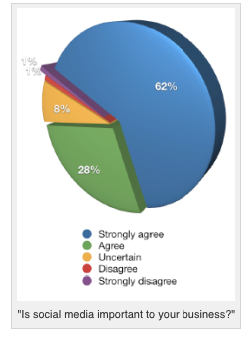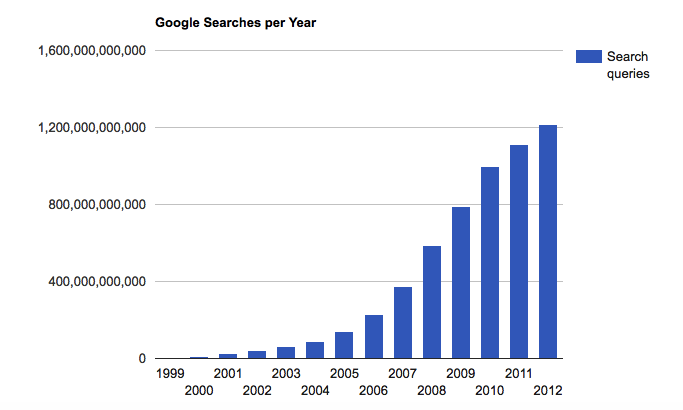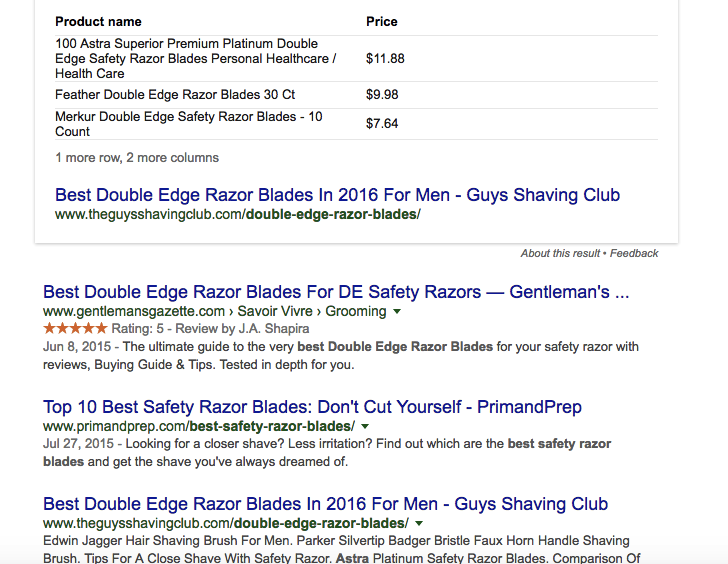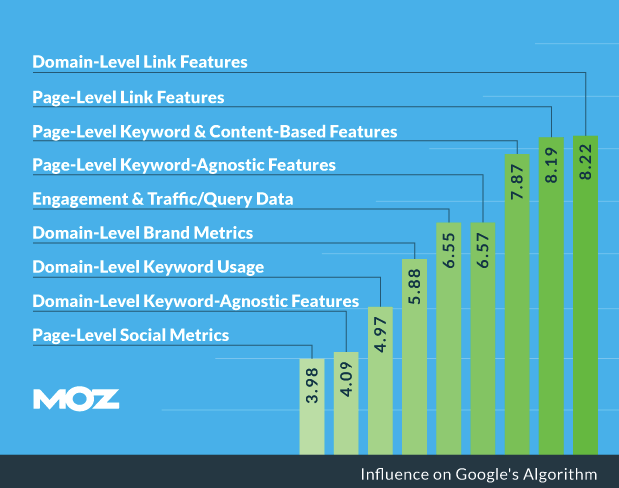How Any Small Business Can Compete with the Big Boys Using SEO and Social Media - Quick Sprout
How Any Small Business Can Compete with the Big Boys Using SEO and Social Media - Quick Sprout |
| How Any Small Business Can Compete with the Big Boys Using SEO and Social Media Posted: 23 Sep 2016 08:25 AM PDT I get it. I understand how brutal it can be—trying to market your small business in a world of billion-dollar businesses and multi-million dollar marketing budgets. You have a limited budget, limited time, limited knowledge, and a limited arsenal of tactics that you can afford to implement. But the big brands? They can do anything they want, hire as many people as they want, and unleash any tactic they want. Today's small businesses are forced to compete in an increasingly saturated marketplace. The competition is fierce, and it has become incredibly difficult to rise above the noise. Combine this with the massive disparity between a small business's marketing budget and a much larger enterprise's seemingly infinite resources, and it's obvious that the cards are stacked against small businesses. In fact, finding new customers is one of the top concerns of small business owners, and 66% claim this is the biggest issue they face. How can small businesses tip the scales in their favor and go head to head with mega juggernauts? It all boils down to two specific marketing strategies: SEO and social media. When done correctly, these strategies can help any small business compete with the big boys. I've been able to help small businesses do exactly that—upset the sumo-wrestler-size businesses in their niche. It's part of the glory of digital marketing. Anyone can compete. Anyone can succeed. Even the little guy. You just have to know how. Leveling the playing fieldThe beautiful thing about these two mediums—SEO and social media—is that they are impartial. They show no favoritism. Google doesn't care what business is offering which product. It's just looking to provide users with the best and most relevant results. The same goes for social media. It doesn't matter if it's a brand new startup bootstrapping its marketing or a well established company that's been around for years. You can still achieve significant exposure as long as you understand the process and how to reach your demographic effectively. While it is true that there will be inherent difficulty outranking a behemoth like Amazon or Walmart on search engines and you're unlikely to gain the same size of a social media following as a corporate titan, the right know-how definitely makes it possible for small businesses to gain traction. It's a matter of implementing the right techniques and having an understanding of the processes that are working at the moment. Small businesses benefit the most from social mediaA 2011 Social Media Marketing Industry Report came up with some interesting findings in terms of who benefited the most from social media. According to their findings, 90% of respondents agreed social media was important to their businesses. The interesting thing is that 67% of self-employed individuals and 66% of small business owners were more likely to strongly agree with this statement.
In terms of the specific advantages, 88% of respondents said the top benefit was increased exposure for their businesses. Second, at 72%, was increased traffic/subscribers.
With roughly two-thirds of all small business owners claiming social media was important to their businesses, it's clear that a well run campaign can have a significant impact. You also have to take into account the possibility for going viral and seeing massive growth in an extremely short period of time. If you really understand your audience and know how to connect with them on social media, you can not only gain exposure but also earn your audience’s loyalty and bring repeat business. So in theory, a no-name startup can experience wide scale exposure overnight and get a flood of traffic along with off the chart sales. Killing it at SEOThere's no denying that search engines have forever changed the way we find information and the way businesses approach marketing. To put some perspective on things, "Google processes over 40,000 search queries every second on average, which translates to over 3.5 billion searches per day and 1.2 trillion searches per year worldwide."
Wow! That's a lot. But let's be honest. Small businesses stand little to no chance of outranking colossal companies for broad search terms. But when small businesses use smart tactics like long-tail keyword phrases, they have a realistic chance to outrank the big boys. Here's a very simple example. I entered the keywords "razor blade" on Google—a very broad search term. As you might expect, the top results were dominated by Amazon:
Then I entered a more specific and much narrower search term, "best double edged razor blades." Here are the results:
As you can see, much smaller companies are getting the top results, and Amazon is the very last entry on the first page. Of course, the more specific, long-tail, keywords won’t get as many searches as the broad ones. But they can still generate a lot of quality organic traffic. This allows small SEO-savvy businesses to consistently bring in a stream of leads that are ready to buy. My hyper-simplistic example by no means demonstrates the full potential of SEO for small businesses. It simply proves that small businesses can in fact compete with their much larger counterparts. Ideal for small marketing budgetsWhat's the primary advantage large companies have over small ones? Money. Of course, they have a plethora of other advantages like more brand equity, a formal marketing department, an HR department, etc. But when you break it all down, big businesses can easily have hundreds of thousands, or even millions, of dollars to funnel into their marketing campaigns each year. On the other hand, small startups may be on a shoestring budget, and $50,000 annually may seem like a lot. Fortunately, legitimate SEO and social media campaigns can be run without a lot of financial backing. This is especially true when you do everything in-house. Rather than hiring a high priced marketing agency, small businesses can cut back on their costs significantly by having staff members run their campaigns. Instead of a financial investment, a time investment can bring about legitimate results. The point I'm trying to make here is that SEO and social media are both cost-effective marketing channels and can be very affordable if you're willing to put in the time. In fact, "those who spend at least six hours per week are almost twice as likely to see leads generated as those who spend five or fewer hours."
While small companies probably won't have the budget for expensive mediums like TV commercials or paying big-named influencers like Taylor Swift to promote their products, they can almost always afford SEO and social media. And when they really know what they're doing and stay up-to-date on cutting-edge techniques, there's absolutely no reason why they can't compete with the big boys. How can I thrive on SEO and social media?I'll be totally upfront with you. Seldom can you just launch an SEO or social media campaign and get instant results. And quite frankly, it's not as easy as it looks. On paper, it might seem like you simply perform some rudimentary keyword research or post a cool article on your Facebook and Twitter accounts. Then presto, an influx of traffic floods your site, and your product flies off the shelf. But that's just not how it works. To truly reap the benefits of these marketing strategies, you need to develop an in-depth understanding of the process, go through trial and error, and have plenty of patience. You also need to stay in the know of what's going on and continually make adjustments as new trends unfold. But nonetheless, you definitely can thrive as long as you "get it" and persevere. The good thing is, there is an abundance of free resources online that will teach you everything you need to know. Sites like Moz, HubSpot, Quick Sprout, Social Media Examiner, and Search Engine Journal are just a few that can guide your efforts. So, let's briefly examine some specific ways you can position your small business to compete with large competitors. Effective SEO strategiesFor starters, it pays to be niche-centric with your approach. Ideally, your business will cater to a fairly narrow target audience. Rather than trying to be everything to everyone, you're usually better off focusing on a smaller demographic and being the company that's best capable of meeting their unique needs. This mainly revolves around using long-tail keywords rather than trying to rank for broad terms. Let's go back to my example about "razor blades" and "best double edged razor blades." While the former keyword phrase would be extremely difficult to rank for, the latter is a realistic possibility. In fact, small businesses were able to rank for it and bring in a reasonable amount of traffic and leads. It's also important that you pursue link-building opportunities. According to Moz, domain-level link features, such as quality of links, trust, domain-level PageRank, etc., were the number one influencing factor on Google algorithm in 2015.
You can accelerate your SEO campaign exponentially by reaching out to and building relationships with influencers and top publications. If you're able to get links from reputable sites, this can be the catalyst for a spike in your search rankings. Some other strategies include:
Potent social media strategiesI love social media because it gives small businesses the opportunity to convey their identities and build highly personalized relationships with their audiences. You can showcase your swagger and let consumers know why your company is worth doing business with. It may sound a little cheesy, but I think the most important part of finding success on social media is to be yourself. I, for example, am building my strategy with the specific goal of reaching MY customers and not worrying about the masses. This coincides with Seth Godin's concept of building a tribe (a community) around your brand. Like the old saying goes, "Try to please everyone, and you’ll end up pleasing no one." Dollar Shave Club is a great example of a brand that embraces being itself. Their off-kilter, slightly smart-ass marketing messages are unforgettable and definitely appeal to a certain segment of the population. Saying things like, "Our blades are f**king great" is ballsy. But it's hard to deny that this attitude has been a key contributor to their success.
Another integral element of a well run social media campaign is to be constantly engaging your audience. Whether it's retweeting epic content relevant to your niche, responding to comments on your Facebook page, inviting others to connect on LinkedIn, or asking questions to ignite digital discussions, it's important that you're interacting. In other words, be on the offense. The great thing about social is that it can actually be used as an outlet for handling certain aspects of customer service. People love giving their feedback via social channels, which gives you an opportunity to strengthen relationships and quickly fix escalating situations when the feedback happens to be negative. It's also essential that you're using the right networks. Each social network has its own demographic and appeals to a different segment of the population. You want to make sure you're spending your time on the networks your core audience is using. For example, if your target audience is primarily female, Pinterest would be one of your best bets because 81% of Pinterest users are female. Some other strategies include the following:
ConclusionIn my opinion, the current day and age is the most exciting ever for small business owners. While in the past, smaller enterprises almost always had to play second fiddle to huge companies and "pick up the marketing scraps," these days, it's totally possible for them to compete and even thrive. Even if you just recently launched a startup and have to watch every penny, you can still get ahead and create massive exposure for your brand. By getting on board with SEO and social media and understanding the nuts and bolts of these mediums, you can gain traction in your industry and drive quality leads to your site. Can you think of any other marketing strategies that level the playing field between small and large businesses? |
| You are subscribed to email updates from Quick Sprout. To stop receiving these emails, you may unsubscribe now. | Email delivery powered by Google |
| Google Inc., 1600 Amphitheatre Parkway, Mountain View, CA 94043, United States | |







